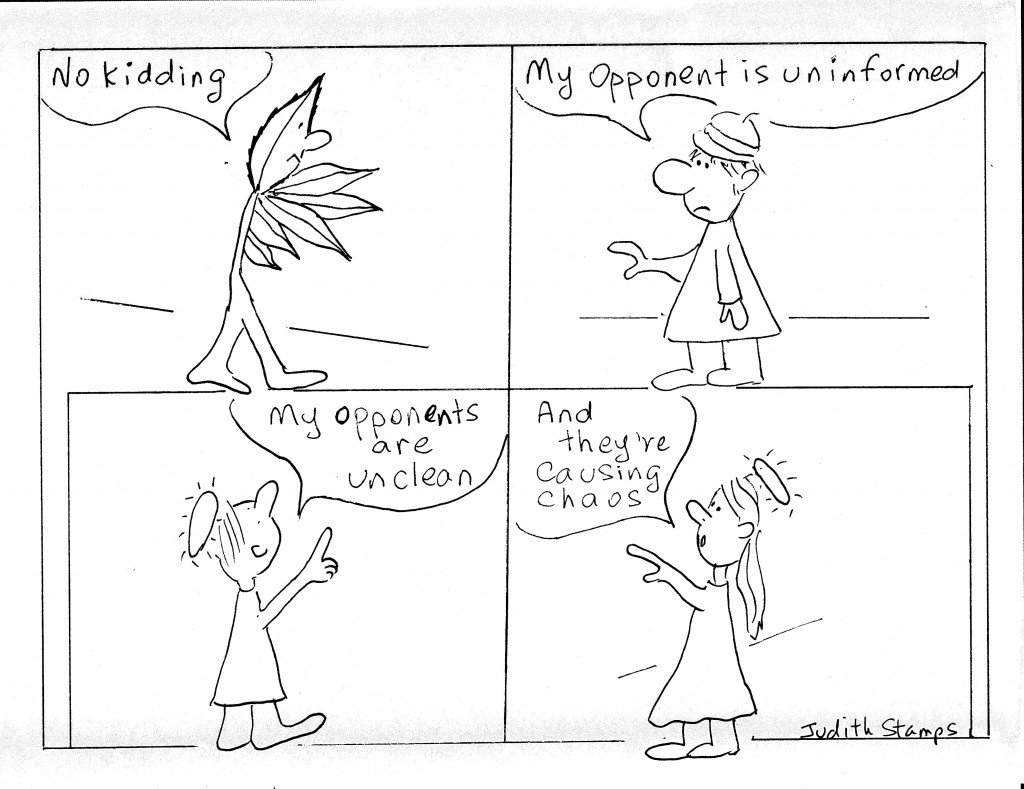Notes on the February 4th Event at the University of Victoria
Last Wednesday I trotted off to UVIC’s Farquar Auditorium to listen to a ‘debate/discussion’ on legalizing marijuana, put on by the UVSS—the student society. They had organized a panel with four speakers, two pro, two con. On the pro side were activist Marc Emery, and criminologist and LEAP member John Anderson; on the ‘no’ side were two ex-addicts—graduates of twelve step programs, who now run addiction recovery clinics. They were: Jim O’Rourke, executive director of Vision Quest, and Geri Bemister, owner of Revelation Works. Both teach criminology at local colleges. AA style, and unlike Emery or Anderson, both recounted their personal stories. Geri Bemister had smoked pot at an early age, and had a predisposition to addiction; Jim had once lived a life of violent crime. The event had a moderator: Joe Perkins, news anchor at CTV News. The audience—about 200 strong—ranged widely in age.
These were the rules of engagement. Each panelist spoke for five minutes at the outset, and five minutes at the end. In between, panelists were asked to respond to questions from the audience. The moderator enforced time limits, and otherwise cut off speakers where he thought it necessary. The exchange was advertised in the student newspaper as an opportunity to explore, from various perspectives, the nuances of marijuana law. No such thing happened. No nuance, no exploration. There was some shouting, if that counts. There were stunningly inaccurate claims by Bemister and O’Rourke. There were no direct rebuttals, so there was no debate. The moderator, well meaning though he was, extinguished all spontaneous talk, so there was no discussion either. This left a series of isolated mini-talks punctuated by applause, eruptions, and grumbling among the listeners. To avoid a mess like this, here’s a plan.
- Do not invite evangelical, ex-addicted prohibitionists to a debate on legalizing cannabis. If you do, you’ll hear stories about how warped and dangerous they used to be, followed by negative stuff on the cannabis community that has been neither warped nor dangerous. Mmph. You will then be attacked by claims like these. Marijuana has been prohibited for almost 100 years, and yet there is no research. (Geri Bemister) These days you can just tell some doctor that you have a headache, get a prescription, and grow a few plants—which will yield 75 pounds of cannabis. (Jim O’Rourke) A thoughtful creature will then approach a microphone and ask: have you ever heard of CBD? You’ll think: There is hope. But the world is cruel. Geri Bemister, or someone like her, will respond with: Is that that stuff those doctors put in those pills? Along with most of the audience you will recite: no, that was Marinol: THC. The prohibitionists will have never heard of CBD. But they will guarantee this: The Hell’s Angels will take over cannabis anyway: they do their own research, and have it all planned out. (Geri Bemister) By this time you’ll be noticing that absurdity is weirdly psychoactive. That’s when you get hit with the hard stuff: So how do you feel about people smoking pot around their babies? We already have fetal alcohol syndrome. You want marijuana baby syndrome? Remember Thalidomide? You want more fetal deformities? (Jim O’Rourke) After two hours of this draggy stuff you leave. With your $10.00 ticket, now rendered porous by unconscious scrunching and unfolding, you wipe away a tear. Meanwhile, this sentence will have buried itself in your pre-frontal cortex, later to haunt your dreams: Cannabis is a depressant; it leads to suicide. (Bemister and O’Rourke) See the point? Don’t do it.
- Do not rely on brief speeches and audience questions for structure. In a real debate each point gets rebuttal. So when one side says: There is no research, the other side has to meet the point. They rattle off, for example, the various commissions starting from the Indian Hemp Drugs Commission in 1894 and ending with the 2002 Canadian Senate Report, and ask: Why don’t these count as research? That kind of exchange never happened. John Anderson, bless his heart, talked about the 2002 report, praising its form as a meta-analysis of many studies. If the prohibitionists heard him, you couldn’t tell. If they’d even heard of the report you couldn’t tell either.
- Do not muzzle audience members who approach the microphone by telling them: That wasn’t a question. Why does it have to be a question? A few people on Wednesday evening attempted genuine debate by responding to panelists’ claims. Jodie Emery named some sources of research and suggested the ‘no’ side make a note of them. The moderator said: That’s not a question. Then a student said she had graduated with high marks, helped along by cannabis. But she wanted to see a regulated market with product labels. That wasn’t a question either, but it got this response: So move to a place where it’s legal (Geri Bemister). Who pays speakers to tell them to go away?
- If you want dialogue, do not muzzle members of the panel whenever they try to speak directly to one another. Because then there will be no dialogue at all. Marc Emery loves to speechify. Out of the blue, and out of order he announced: Everything you do in this world from driving to cooking can kill you, except for enjoying cannabis. Sugar will kill you; sex will kill you; eating will kill you. Only cannabis won’t kill you. I needed a good laugh, although it seems now that he really meant it. In any case, it is an intriguing thought, and somebody should have been invited to respond. John Anderson, I think, is more conservative. He and Marc might have had a nuanced debate.
- Make sure the ‘no’ side addresses all points made on the role of liberty in a healthy society. On this topic John Anderson quoted John Stuart Mill’s iconic essay, which argues that citizens in free association should be allowed any activity that does not hurt others. Marc Emery said: If you don’t have autonomy, you’re not a human being. No one insisted that the opposition reply. That isn’t good enough.
- Choose a moderator with lots of experience and extensive, in-depth knowledge of the subject. He or she will be the key to your success.
 I caught up with Marc Emery the next day. He’d been hired through a speaker’s bureau, and up until the week before, had expected to be the sole speaker. The panel was a last minute addition, the student society’s doing. He had, he said, new ideas to share. I guess we’ll have to hear those some other time. On Wednesday he was too busy deflecting the missiles. He noted too that cannabis opponents who show up for debates are almost always ex-addicts. There’s an interesting piece of information. Maybe there is no such thing as a rational opponent to legalization.
I caught up with Marc Emery the next day. He’d been hired through a speaker’s bureau, and up until the week before, had expected to be the sole speaker. The panel was a last minute addition, the student society’s doing. He had, he said, new ideas to share. I guess we’ll have to hear those some other time. On Wednesday he was too busy deflecting the missiles. He noted too that cannabis opponents who show up for debates are almost always ex-addicts. There’s an interesting piece of information. Maybe there is no such thing as a rational opponent to legalization.
Actually, that’s not quite true. There is a ‘no’ position that is amenable to debate. Some activists oppose legalization because they want a purer form of freedom—an absence of all regulation. I can’t agree. There are snarly characters out there I would rather see kept on a leash. But I am sympathetic to the utopian impulse, and it’s worth debating. There’s nothing like a good discussion on human nature.
Marc felt that the event was a waste of his time. He thought it was poorly advertised. It was also poorly located: on a dark and rainy winter’s evening, it was an hour’s bus-ride from downtown Victoria. In the future he plans to organize his own events. He says he’s looking for a more sympathetic audience, people with whom he can share some recent thoughts. I think he’s really looking for a better plan. As I saw it, the UVIC audience was sympathetic, and an attendance of 200 isn’t bad; it was the lack of structure wrecked this event.
Thus, alas, ends the story of the little discussion that wasn’t. Here is the accompanying lesson. Imagine a room with homeless people on one side, and well-paid bank managers on the other. What sort of discussion do you imagine they could they have? Subtle? If you want nuance in discourse, choose discussants that are close in their opinions. The closer, the subtler. The subtler, the better at enhancing understanding. And don’t allow questions from the audience to dominate an evening. The questions will come from all over the map. For good discussion you need to stay on a topic for a while.

I left the auditorium that evening especially regretful that we didn’t get to hear more from John Anderson. He’s a good speaker and is well informed. He favours regulation, an opinion I share. I bet, given a chance, he would have had interesting things to say on what regulations would work, and how best to implement them. We never got a chance to get into that. But he is quiet, and that night you had to be pushy to be heard. The next time the Fishing, Foraging, Fancy Needlework, Friendship and Fine Cannabis Society (FFFFF) hosts its annual dinner, I think we should invite him.





